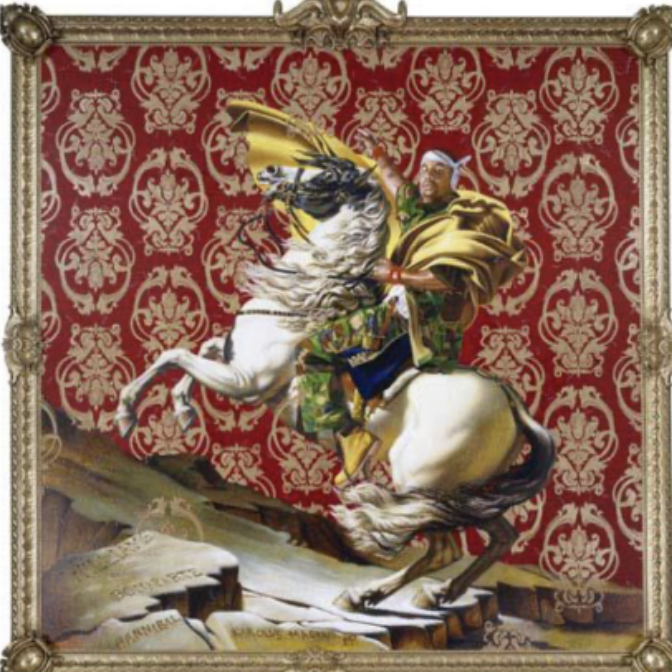Unit 5 Pieces
1/23
There's no tags or description
Looks like no tags are added yet.
Name | Mastery | Learn | Test | Matching | Spaced | Call with Kai |
|---|
No analytics yet
Send a link to your students to track their progress
24 Terms
Renoir, Le Moulin de la Galette, 1876 ESSAY!!!
made: Paris, France
@: Musee d’ Orsay, paris
medium: oil on canvas
style: impressionism, discreet brushwork to capture the effects of sunlight with light and blue shadows, painting outside, painting a fleeting moment of dancing/people enjoying the day
subject: wanted to capture the new leisure activities of Paris, a new famous dance bar and park, beautifully dressed young couples in the sun, dancing, conversing, drinking, capture movement of dance and of harmony in the enjoyment of society and company
setting: Le moulin de la Galette
main figures: portraits of his friends/ couples dancing/ people conversing/ drinking (patrons where typically friends, so painted them in the piece
important contributions: impressionism
Renoir: impressionist artists, friends with Monet, around studios and galleries with other impressionist friends
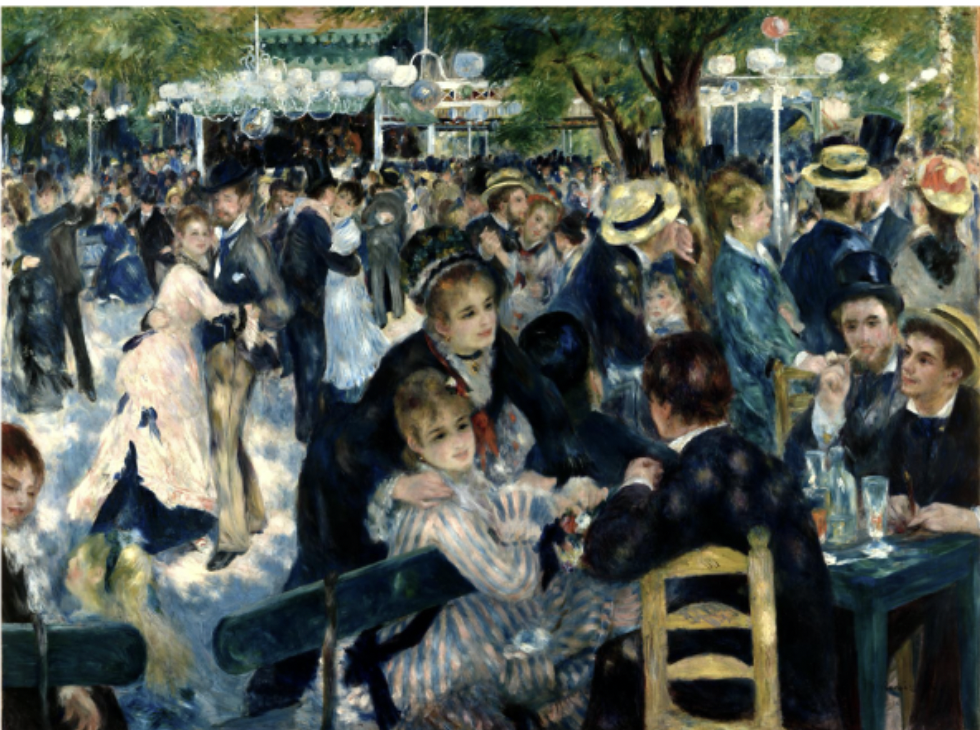
Matisse, Le Bonheur de Vire (The Joy of Life), 1905-1906
fauvism
oil on canvas, Barnes Foundation, Merion
genre painting
landscape with non-landscape colors
framing elements of trees, very stylyzed
pasteroural ground of nude figures
linear perspective, stylized, fluidity
figures are meant to stand out from background,
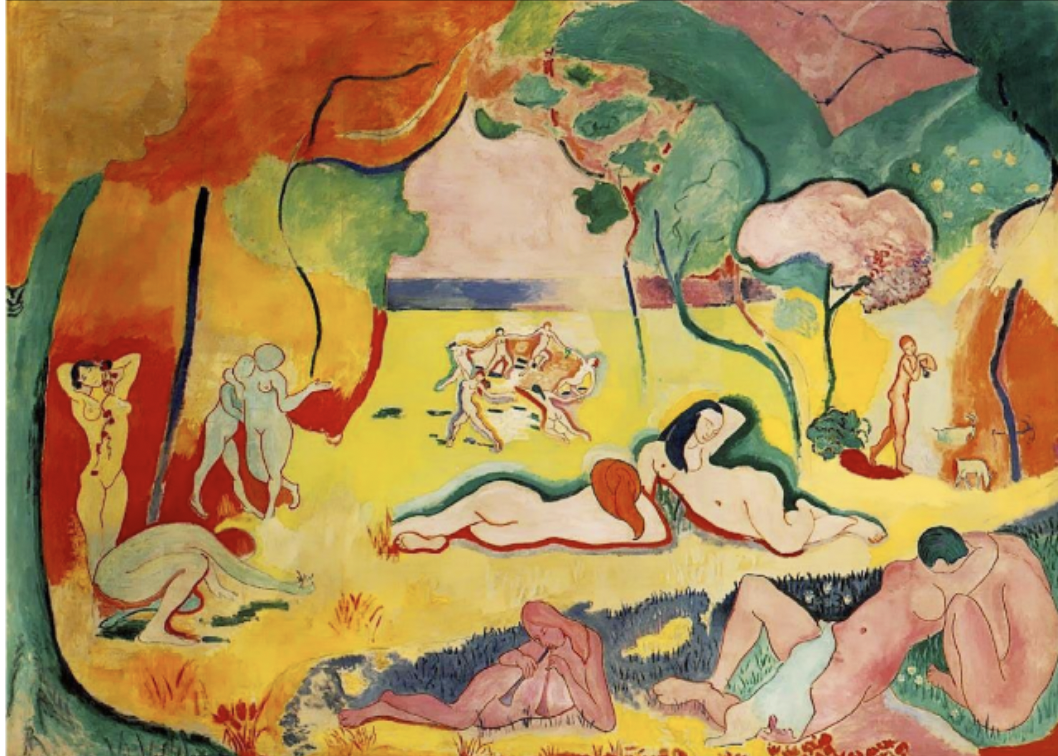
Georgia O’Keeffe, Red Poppy, 1927
feminist art
famous painter of flowers making them abstract and orgainc
grasp the personality and story of the flower as a portrait
bright colors
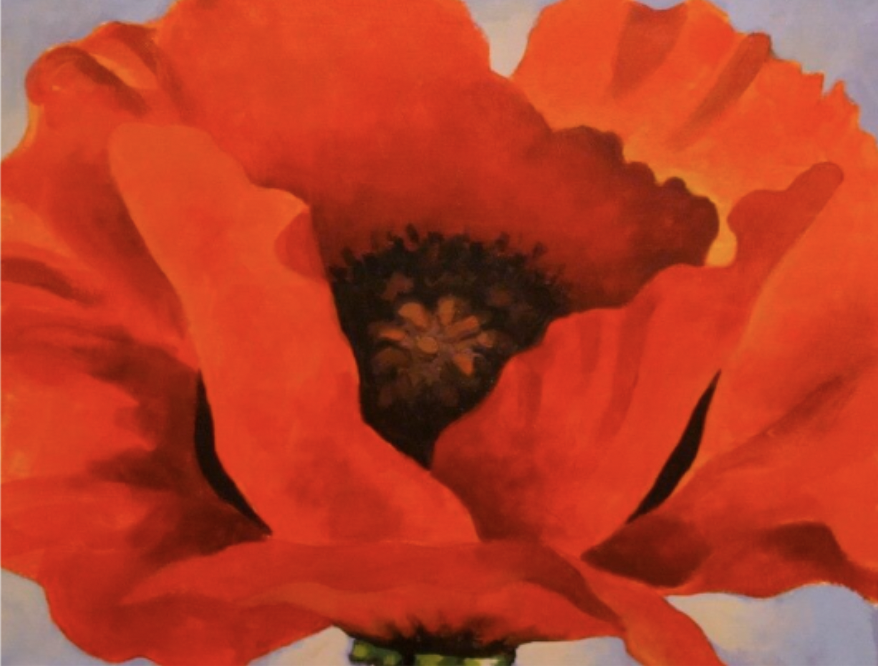
Monet, Saint-Lazare Train Station, 1877
oil on canvas, in the Musee d’ Orsay, Paris
one of a series of train stations
impressed by these new features of industrialism of the train the train stations
capture the impressions made by the smoke/steam
blur the edges of famous buildings
train station = industrialized cathedral (acts as archeological frame for painting of trains)
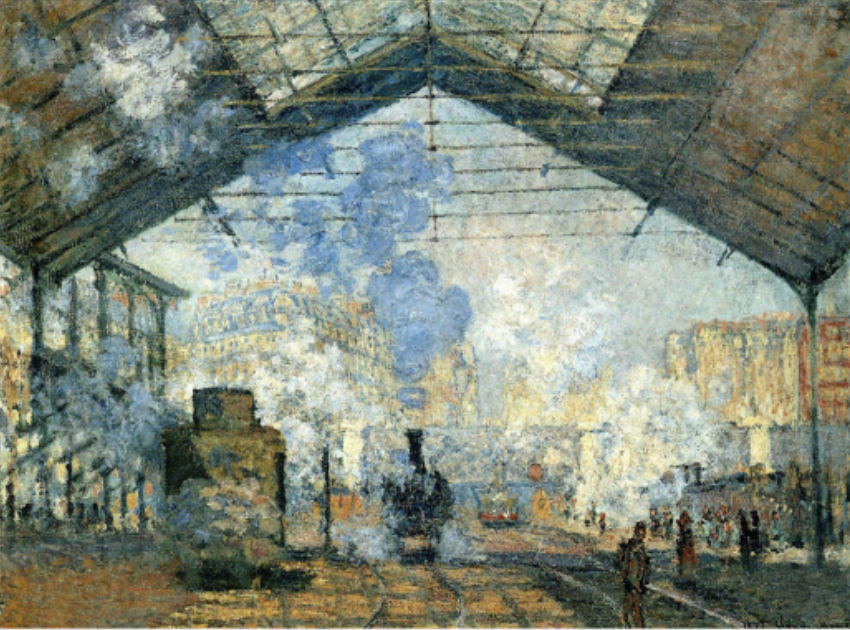
Berthe Morisot, Summer Day, 1879
oil on canvas, National Gallery of London (Lane Bequest, 1917)
two women, one looking at the ducks, one looking at the viewer very worried
water is a bit more cloudy and reflective colors
figures are less defined
added sense of concern and anxiety
Morisot - liked to paint pictures of mothers and children, discreet brush work, influenced by Monet, nature pictures
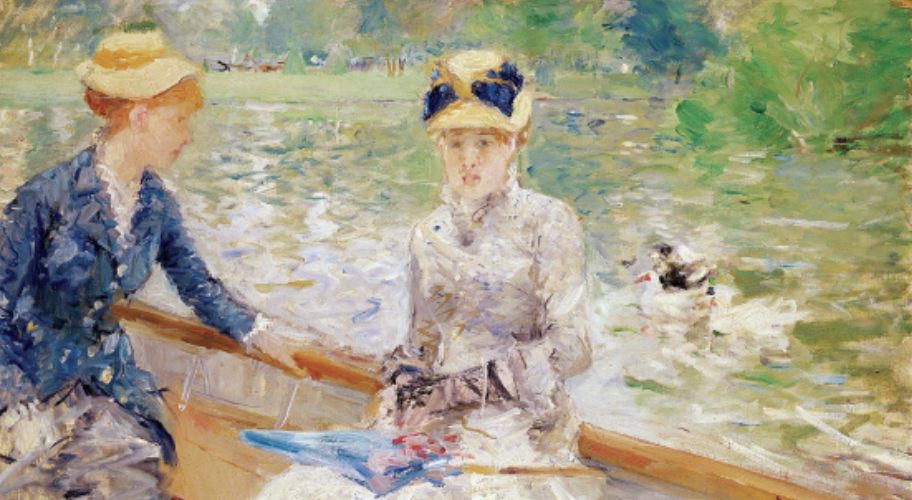
Gauguin, Vision after the Sermon or Jacob Wrestling with the Angel, 1888
post-impressionism (shouldn’t look like nature)
oil on canvas, National Gallery of Scotland, Edinburgh
tree in forefront influenced by Japanese prints with flatness and that type of tree
a “throwback” to woman in very modest culture
characters are flattened and but off
Jacob Wrestling with the angel is what the sermon was on
landscape is red
!use elements from nature but re make them in your mind to have symbolic and psychological meaning, believed the same of the human form being flattened
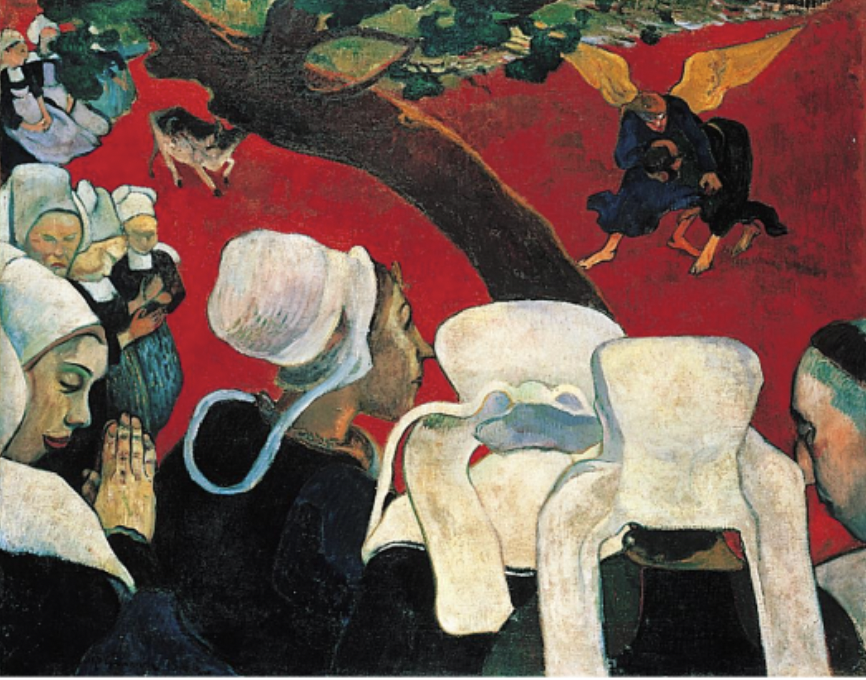
Seurat, Sunday Afternoon on the Isle of the Grand Jatte,1884-1886 ESSAY!!!!
artist: revived mathematical perspective and structure, interested in color theory and combining science and art, made pointillism or divisionism
medium: oil on canvas
@: Art Institute of Chicago
subject: where wealthy people went on a Sunday to show off their wealth to each other, fish, converse, relax, sail
couple in foreground is upper middle class, walking but slightly static
everyone appears to be still, except the man laying down in the front in the working class who appears very relaxed and girl in the back who is running, dogs, and butterflies = people are isolated in their own little worlds
each person is laid out in linear perspective all receding into the distance
setting: Isle of the Grand Jatte on the Sein, France
style: post-impressionism, pointillism/divisionism (all made by dots made of contrasting color next to each other)
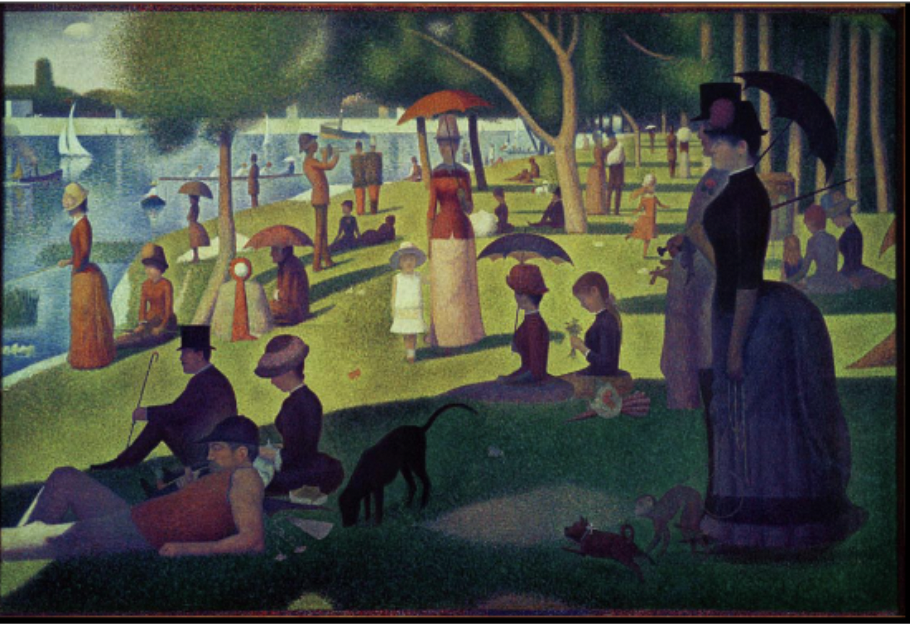
Vincent van Gogh, Starry Night, 1889
post-impressionism
oil on canvas, MET
very emotional
sky is turbid, turbulent
his vision of the sky with an intense radiating energy
not a calm night, but a violent burst of light and energy
below a small town is sleeping peacefully
cypress tree in foreground and seen in cemeteries
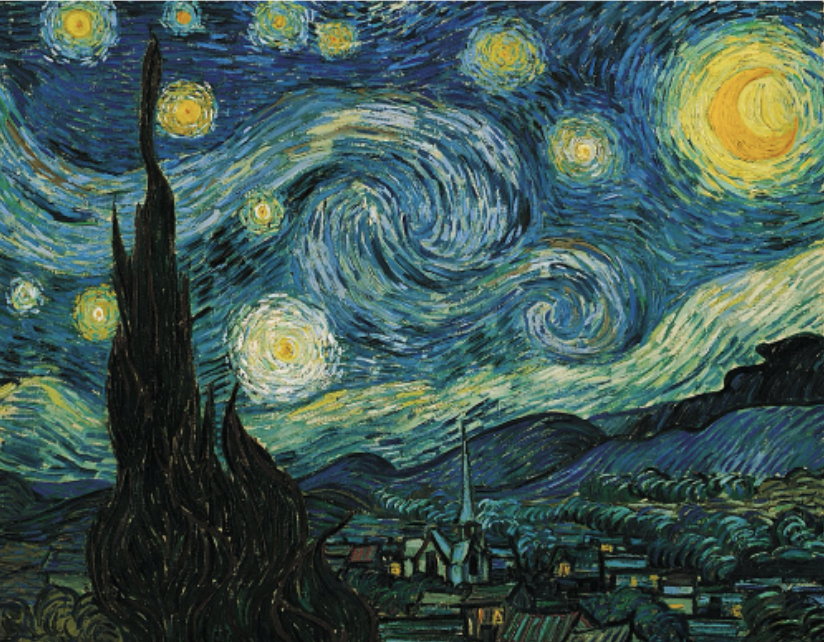
Edvard Munch, The Scream, 1893
symbolism
tempura and pastels on cardboard, National Gallery, Oslo
Munch from Norway
more abstract, flattened figure, using color to express psychology
screaming skull in response to landscape
based on an experience he had as an experience of horror as everything around his is swirling
figures behind him don’t understand what is happening because it is all in his head
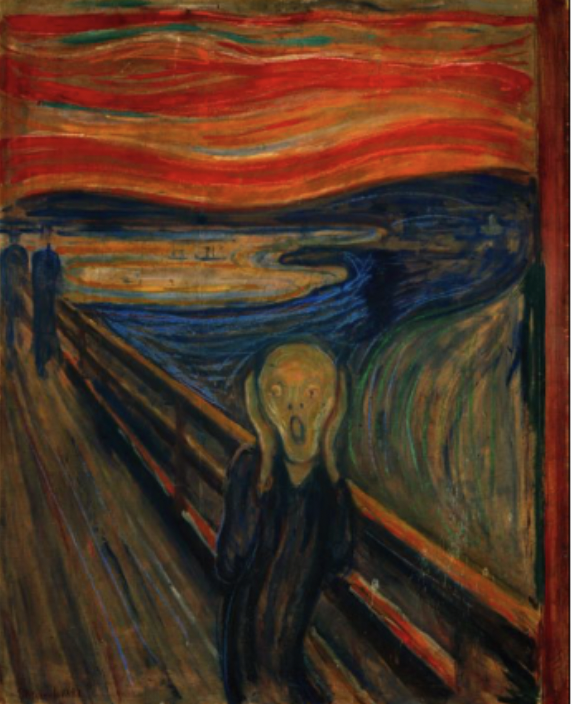
Paul Cézanne, Mont Sainte-Victoire, 1902-1904
post-impresionism
more abstract landscape
oil on canvas, Philadelphia Museum of Art
Cezanne started breaking landscapes into Cubes and how to break it down into different spaces and perspectives
a redo of a painting he did in 1885 in a clearer format
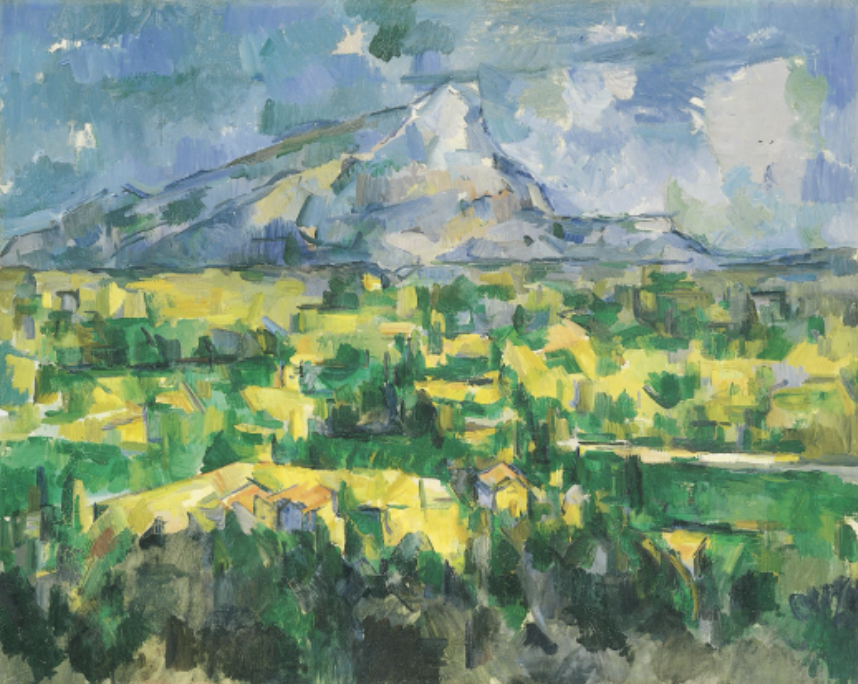
Rodin, The Kiss, 1901-1904
Rodin: french sculpture with focus on human body and psychological suffering
marble, Tate Gallery, London
very powerful male and female figures
classical influence, michelango influence
erotic embrace
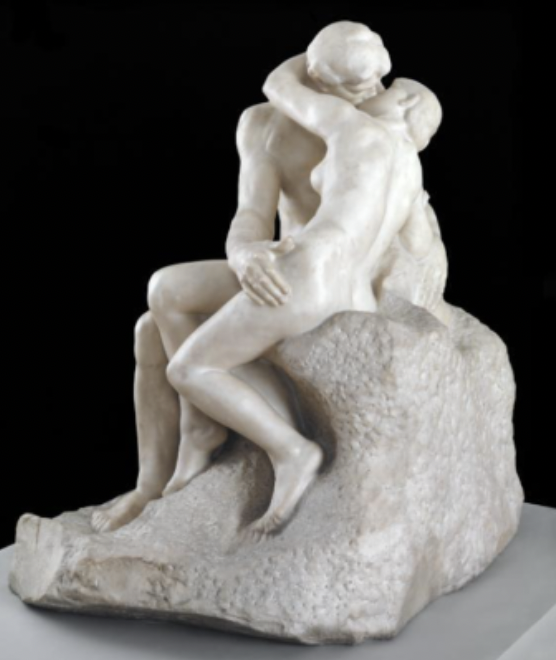
Picasso, Les Desmoiselles d’Avignon, 1907 ESSAY!!!
media: oil on canvas @ his studio in Paris
@: MET
style: cubism, broken fragmented abstracts
subject: women in brothel facing us in very confrontational way, fractured space and different angles of their bodies in geometrical angles, simplified faical features with mask like figures. jagged forms and confrontation face is threatening
subdued color, women pinkish in form, can’t read the space, still life in foreground
setting: women in brothel, can’t make out specific location
Contribution: cubism
patron: gertrude stein
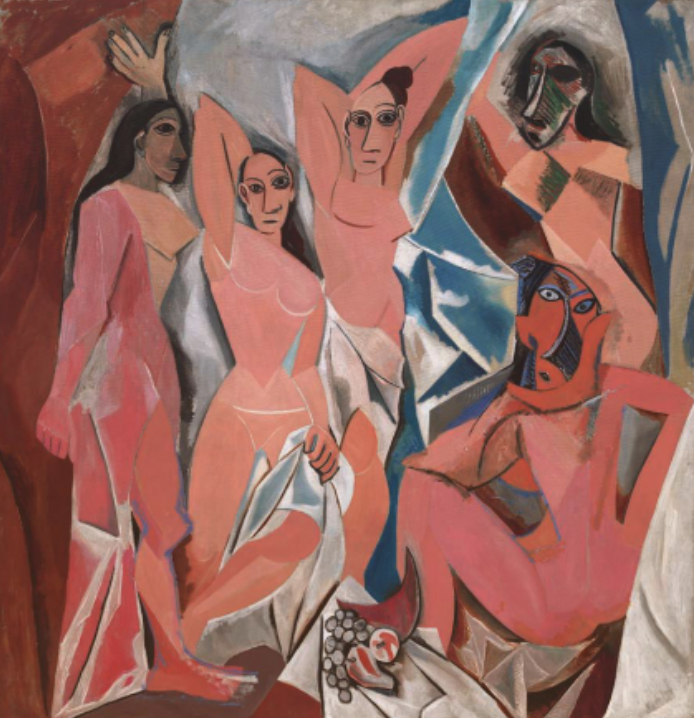
Marcel Duchamp, The Fountain, 1917
dada
photo of original version, 1917 (done in the midst of WWI)
readymade glazed sanitary china with black paint
male urinal (mass produced) not high culture, making it his own art
challenged art = Dada
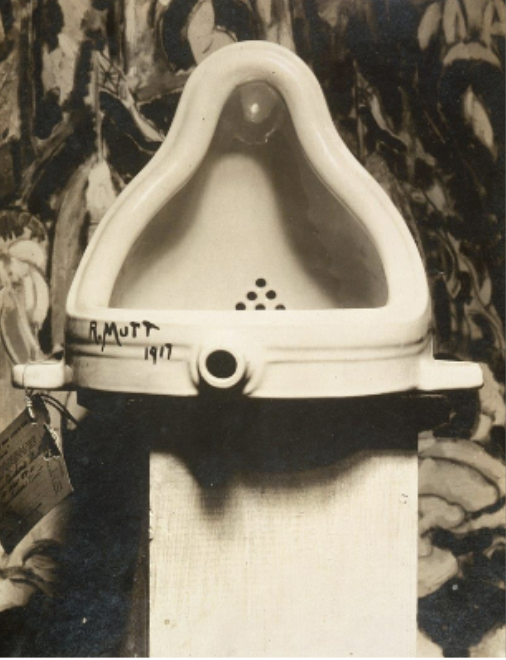
Frank Lloyd Wright, Robie House, 1907-1909
Wright was influential in American architecture (wanted houses to fit into nature and be organic)
Chicago, Illinois
Prairie Style
Chicago was flat, so the house would be flat, very horizontal
house is several levels, lapping asymmetrically
long halls/ rooms
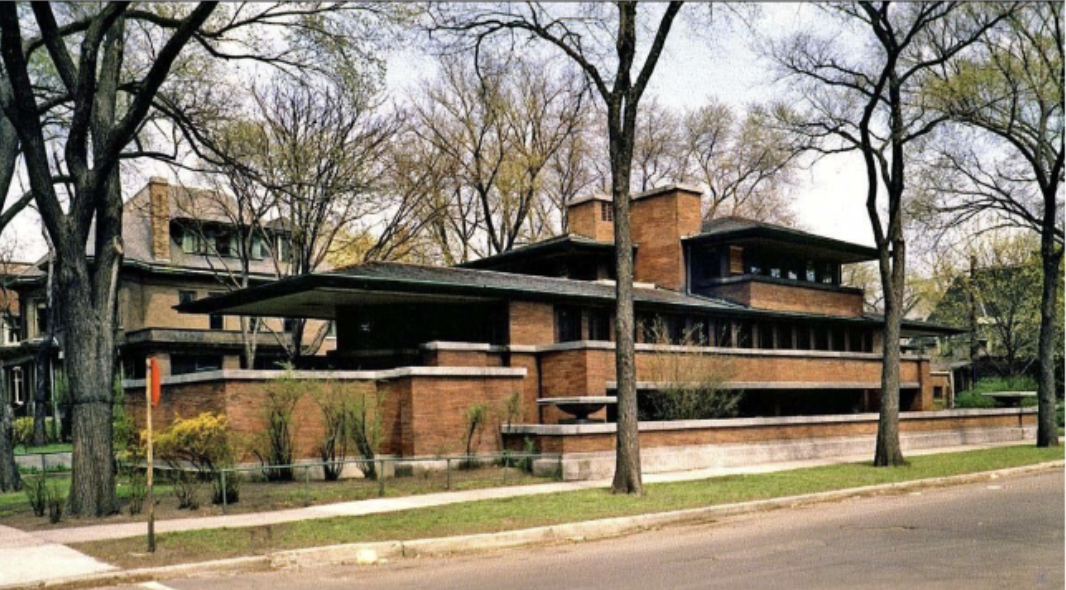
Le Corbusier, Villa Savoye, 1929, Paris
steel and concrete with iron bars to make open design
domestic building - on human scale
people need sun, light, space, views of nature
interior and exterior blend together
no defined entrance or traditional facade
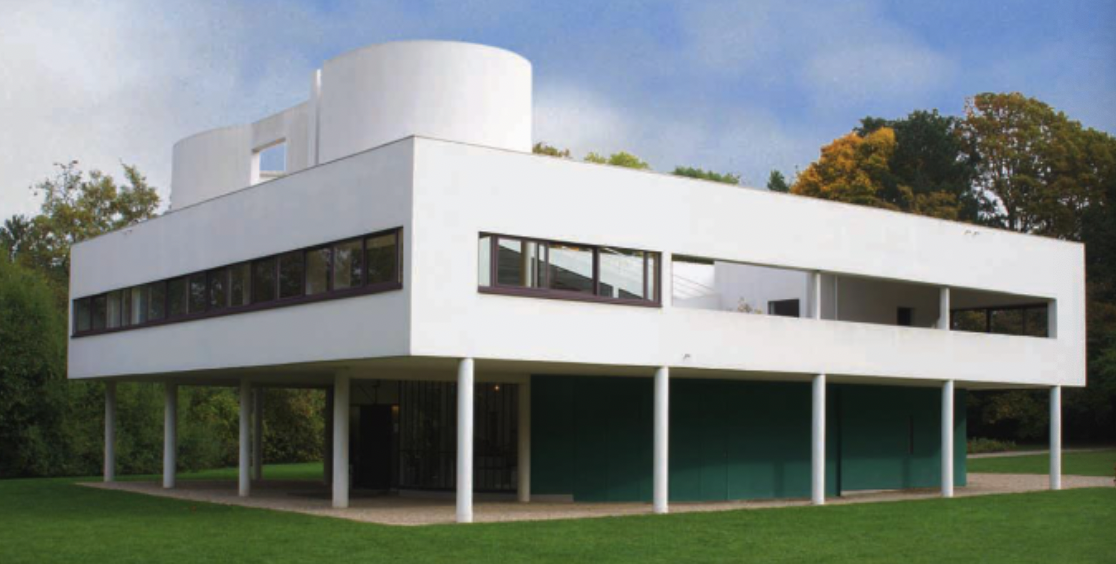
Piet Mondrian, Composition with Red, Blue, and Yellow, 1930
de Stijil, - no direct correlation to reality
oil on canvas
all life forms are gone, still
works are meant to be contemplated with different' line thickness and pure color
flat mathematical forms with movement of the lines
cut off on sides, extending into space
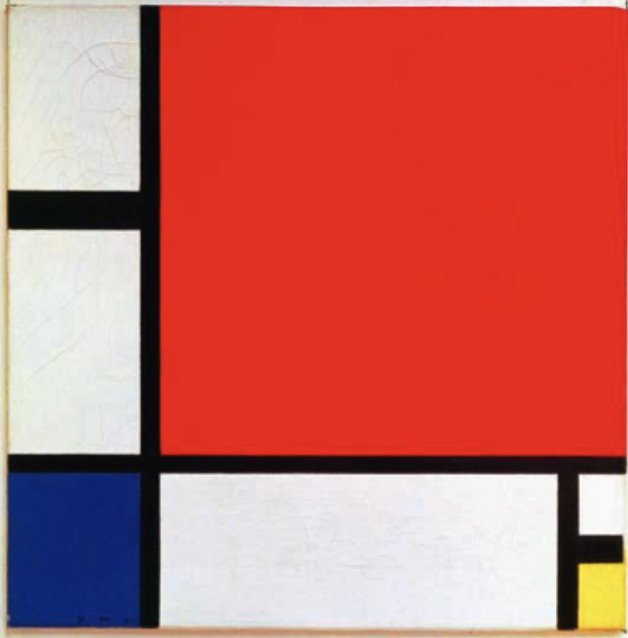
Frida Kahlo, The Two Fridas, 1939 ESSAY!!!
medium: oil on canvas
location: mexico city, mexico
subject: autobiography and identiy of having a german dad and mexican mother, one heart is giving blood to the other, one european and one mexican, one of the arteries is cut, nod toward her multiple surgeries she had throughout her life
style: feminist art lens
setting: barren landscape, neutral, abstract clouds, slightly stormy
she studied anatomy/slighlty abstract
contribution: start of feminist movement
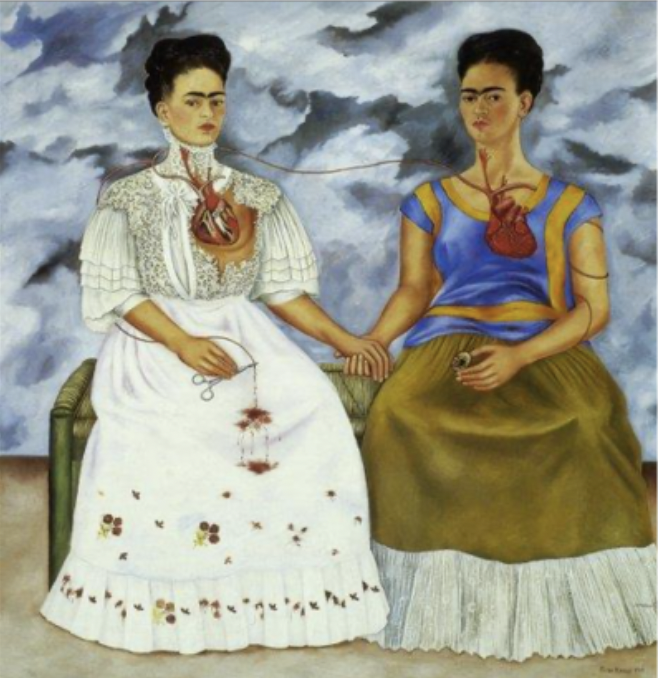
Jacob Lawrence, The Great Migration Series, no. 49, 1940-1941
about African American migration from south still in segregation
urban enviroment (New York, New Jersey)
opportunities to develop their own cultural in the arts
still encountered segregation, express segregation through partition of ropes
separating whites an blacks
abstract plane
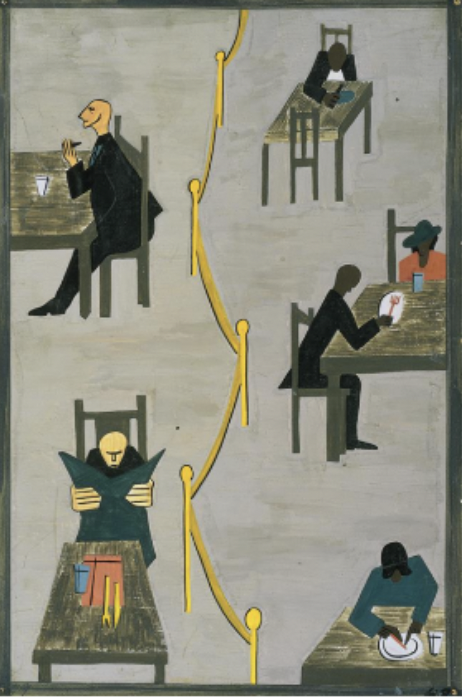
Jackson Pollock, Number 1, 1950 (lavender Mist), 1950
oil, enamel, and aluminum paint on canvas
abstract expressionism
no reality, just an exploration of emotion
deep works that have intense deep patterns, portray deep emotional psychology
meant to convey this abstraction, nothing do to with reality
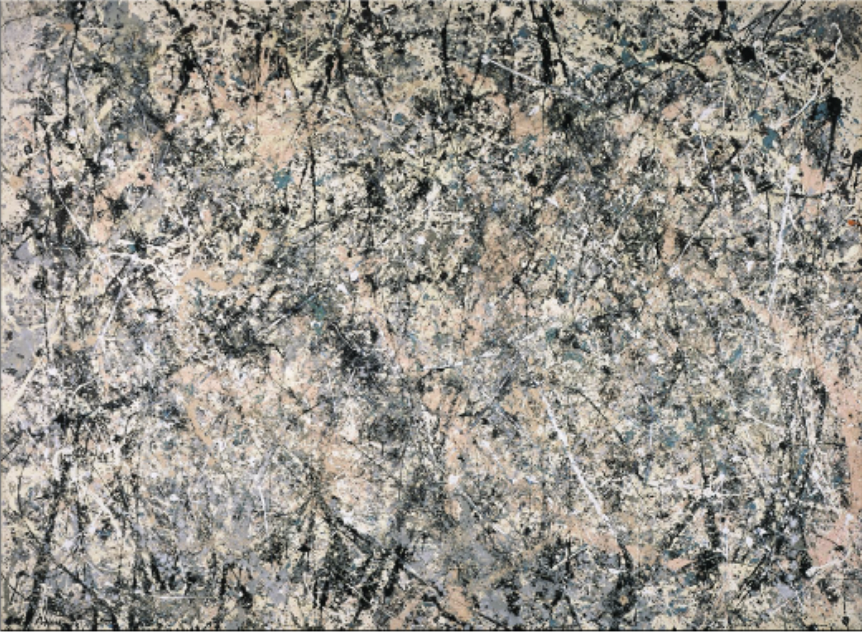
Roy Lichtenstein, Hopeless, 1963
pop art
oil on canvas
enlarged image from comic strip based on melodramatic romance
Benday printing technique of adjacent dots replicated in painting
emitted style of comic book
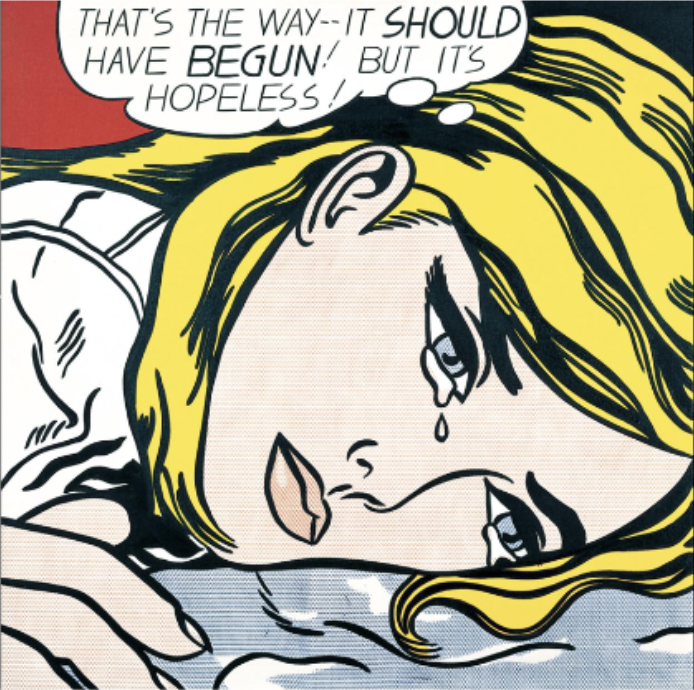
Robert Smithson, Spiral Jetty, 1970
site-specific
Great Salt Lake, Utah
an earth-work sculpture made of mud, sea crystals, and basalt rock
very large, used red color of water for aesthetic impact
periodic drought, and shallow
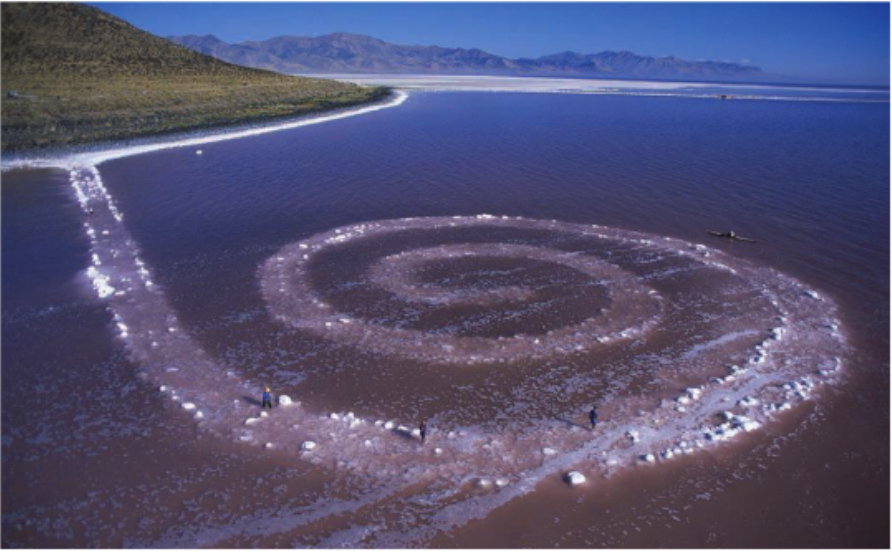
Judy Chicago, The Dinner Party, 1979 ESSAY!!!
style: feminist work
medium: multimedia, ceramics and embroidery
@ Brooklyn Museum
made: in los angeles
subject: have a seat for influential women, a female last supper, 39 unique table settings for different accomplished women, ex: artemisia Gentilischi, emily dickison, female version of last supper
only women worked on
contribution: celebrated many women for their accomplishments
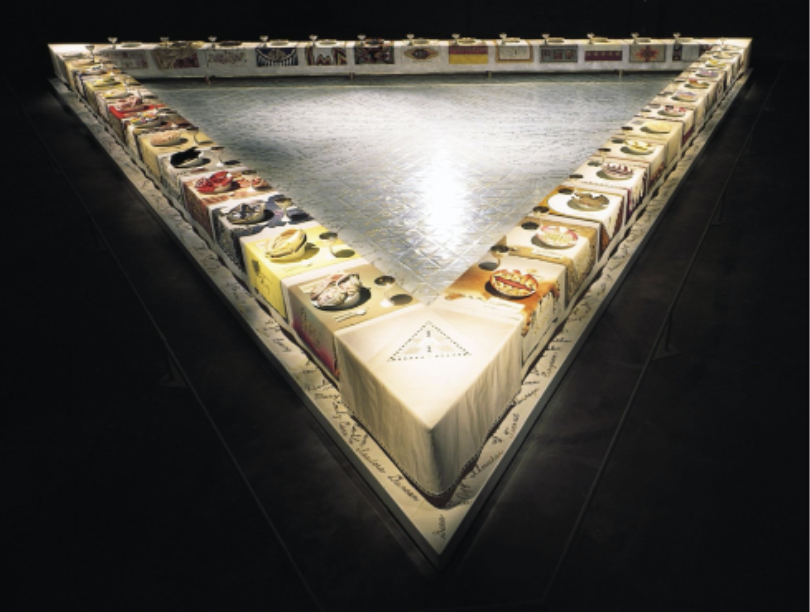
The Guerrilla Girls, Untitled, 1985-1990
feminist art
billboard
Gorilla mask on Ingres, Grande Oldalisque
using it to reveal plight against women in museum world
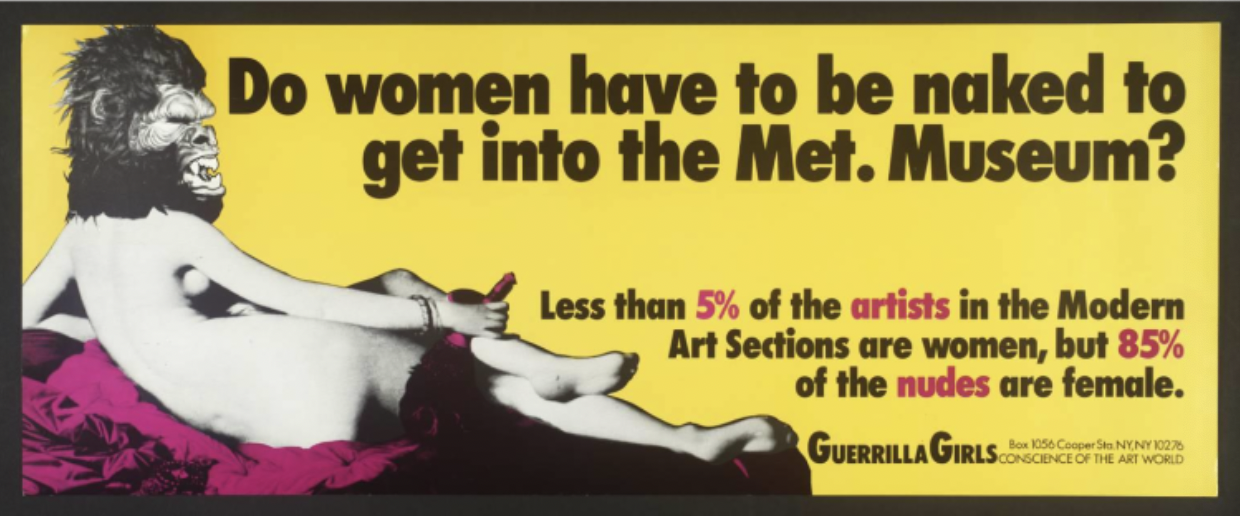
Kehinde Wiley, Napoleon Leading the Army over the Alps, 2005
contemporary art
oil on canvas (@ Brooklyn Museum)
wanted to take on art in which African Americans were excluded
completely alter the meaning by replacing Napoleon with a Black man
horse and foreground are the same
red based wallpaper instead of alps
reinterpretaion of the past
